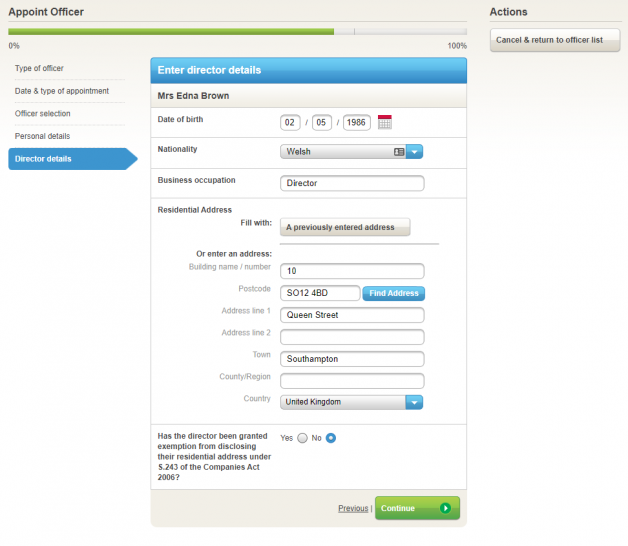In the UK, almost anyone can incorporate a limited company and become one of its directors. But for a multitude of reasons it is best to first establish that the person is capable of fully carrying out the director’s duties that are a requirement for the role.
In this article we lay out the important points to consider when choosing a director, and identify certain red flags that will bar them from directorship.
It is wise for any prospective director and those considering appointing them to be aware of these points and give them due consideration before embarking on the appointment process.
Let’s dive straight in to the key points.
Manage company officer records
Inform Direct knows which Companies House forms you need and helps you complete and submit them. Save time keeping your company officer records clean, correct and up to date.
Key facts about company directors
- A private limited company must have at least one director. A public limited company must have at least two.
- A private limited company can have another limited company as a director. But alongside any such corporate director(s) there must always be at least one real human acting as a director.
- A director’s minimum age is 16.
- They must not be in bankruptcy.
- They must not have been disqualified from acting as a company director under the Company Directors Disqualification Act 1986. This can happen through the decision of a court or acceptance of a voluntary disqualification undertaking.
- Auditors cannot be appointed as directors of companies for which they act.
- Non-executive directors, who are not employees of the company, can lend objectivity and outside experience to board decision-making alongside executive directors.
- Directors are often individual shareholders or company employees, but do not have to be.
- Directors’ names and other personal details are made publicly available at Companies House.
- Directors must provide a UK service address for correspondence and the company must have a registered office address in the UK, but directors do not have to live in the UK.
Conflicts of interest
It is worth considering potential conflicts of interest when making appointments. This is a key area of governance. Some potential conflicts of interest are:
- An interest in a transaction, deal or arrangement
- Accepting benefits from third parties when the benefit is conferred due to their position and powers as director
- A director being on the board of a competitor
- A director being a major shareholder
- A director being a potential customer or supplier of the company.
Good governance requires any potential conflict of interest to be declared to the board, which may either authorise it after taking careful note or declare it an obstacle to the person becoming a director.
Do directors need the word ‘Director’ in their job title?
There is no firm definition of a director in the Companies Acts, but Companies Act 2006 does say that the word director includes any person occupying the position of a director, by whatever name called.
This means that anyone performing the functions of a director would be included, even if their title didn’t include the word itself – so your “Head of Marketing” can be appointed with no change to their job title.
It’s also possible that someone with a job title that includes the word “Director” may not act as a director of the company. An ‘Associate Director’ or similar title is often bestowed upon senior employees without them serving as an appointed director of the company.
However, take care that titles are not misleading, particularly to avoid any misunderstanding that an employee holds a directorship when in fact they don’t.
Are there any other restrictions?
As in so many areas, the company’s articles of association may impose additional restrictions on who can be appointed as a director. The articles may in some cases specify:
- A maximum number of directors which must not be exceeded
- That a proposed director must hold or obtain a certain number of shares in the company
- Other professional qualifications or membership of industry bodies a director must hold.
Mental health
Model Article 18 of the Model Articles for private companies was amended by the 2013 Mental Health (Discrimination) Act. It removed the provision for companies to terminate a director’s appointment on the grounds of mental health.
However, a director may still be removed if a doctor gives their written opinion that the person is likely to remain incapable of being a director for more than three months.
Shadow directors
It is normal for those who control the management of the company to be appointed as directors. If directors are ‘accustomed to act’ under the instructions of someone, that person is treated as a shadow director (Companies Act 2006, 251.1). For more on this, please see our article What is a shadow director?
The shadow director is liable for the acts of the company in much the same way as the other directors. Hence, it’s important that anyone who exerts control in this way is appointed formally – we look at the procedure below.
Alternate directors
It is permitted during a director’s absence or incapacity for them to appoint a temporary stand-in with full powers and voting rights. This is known as an alternate director. There is no statutory provision for such appointments, and it is permissible to appoint one only if the company’s articles of association allow it.
What is the procedure for appointing a director?
The directors at company incorporation are included as part of Companies House form IN01 – the form used to apply to form a company.
Any new director appointment must be notified to Companies House within 14 days, even if the new director was already the company secretary. Promptly telling Companies House that director appointments have taken place helps to avoid the risk of fines.
Following incorporation, any subsequent appointments must follow the procedures set down in the articles of association. Usually these empower the existing board to appoint a new director, or allow shareholders to appoint someone who has been proposed in advance by the board.
Companies House Form AP01 is used for appointments of people as directors and form AP02 for appointments of another company as a director.
When using Inform Direct, the appropriate form for appointing a director is automatically chosen, filled in and sent when you fill in basic details of the new appointment. The details of the appointment are saved, giving you an audit trail. The director’s details can be updated at any time, with Inform Direct then automatically updating Companies House of any changes that need to be reported.
You may also wish to see our article showing how easy it is to appoint a new director in Inform Direct – and how you can make an appointment and many other company secretarial changes completely free of charge.
Remember to update the register of directors and register of directors’ residential addresses with the new director’s details. Again, this is something that Inform Direct does automatically.
Other factors to consider
Other than informing Companies House, new director appointments can also prompt other actions. In another post we run through a checklist of actions to consider when a director is appointed and once the Companies House forms are complete.
This article was originally published in 2013. Its most recent revision was in November 2022.



What a wonderfully clear description. While I work with directors every year, I still picked up a few points I wasn’t previously aware of, so thanks for the clear points.
I am a recent convert to Inform Direct. Its such a marvellous business tool our life is simpler and easy to manage. I have recommended it to numerous clients already and will continue to do so. This article confirms my belief. Thank you so much.